转载自http://www.cppblog.com/guogangj/archive/2009/10/16/98772.html
树,顾名思义,长得像一棵树,不过通常我们画成一棵倒过来的树,根在上,叶在下。不说那么多了,图一看就懂:
当然了,引入了树之后,就不得不引入树的一些概念,这些概念我照样尽量用图,谁会记那么多文字?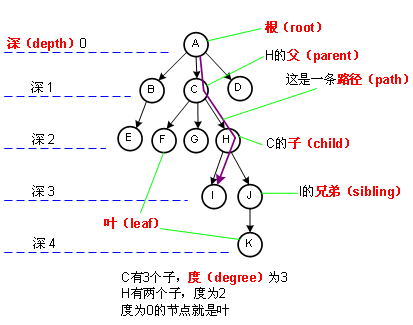
树这种结构还可以表示成下面这种方式,可见树用来描述包含关系是很不错的,但这种包含关系不得出现交叉重叠区域,否则就不能用树描述了,看图: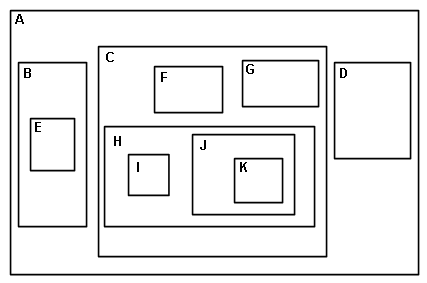
面试的时候我们经常被考到的是一种叫“二叉树”的结构,二叉树当然也是树的一种了,它的特点是除了叶以外的节点都有两个子,图: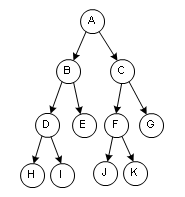
由此我们还可以推出“三叉树”: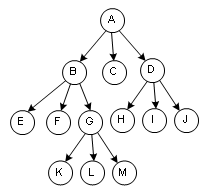
当然还有“四叉树”,“五叉树”,“六叉树”……但太难画了,节点太多,略过。
九、树的遍历(Traversal)
值得再提一下的是二叉树,因为它确实比较特别,节点有两个子,这两个子是有左右之分的,颠倒一下左右,就是不一样的二叉树了,所以左右是不能随便颠倒的。
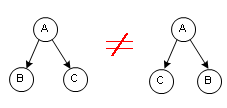
在第三篇讲到“队”的时候,提及到了广度优先遍历(Breadth-first traversal),除了广度优先遍历之外,还有深度优先遍历(Depth-first Traversal),深度优先遍历又可分为:前序遍历(Preorder Traversal),后序遍历(Postorder Traversal)和中序遍历(Inorder Traversal),其中中序遍历只有对二叉树才有意义,下图解释这几种遍历: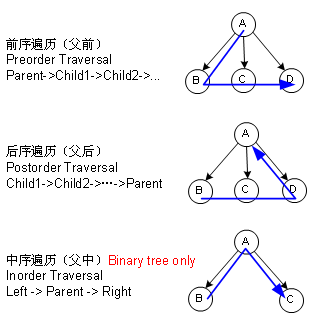
好了,又到代码阶段,写点代码。我看过许多数据结构的教材,二叉树遍历都是必不可少的内容,而且我知道的全部都是用递归实现的,现在,我要求你不用递归,实现对二叉树的中序遍历。怎么办?我给个提示:广度优先遍历时候我们用了队,中序遍历,我们使用*栈*。看看能不能写出来,我也来写:
- #include <stdio.h>
- // TreeNode
- //////////////////////////////////////////////////////////////////////////
- struct TreeNode
- {
- char m_cVal;
- TreeNode* m_pLeft;
- TreeNode* m_pRight;
- TreeNode(char cVal);
- ~TreeNode();
- };
- TreeNode::TreeNode(char cVal)
- {
- m_cVal = cVal;
- m_pLeft = 0;
- m_pRight = 0;
- }
- TreeNode::~TreeNode()
- {
- }
- //Stack
- //////////////////////////////////////////////////////////////////////////
- class Stack
- {
- public:
- Stack(int iAmount = 10);
- ~Stack();
- //return 1 means succeeded, 0 means failed.
- int Pop(TreeNode* &pVal);
- int Push(TreeNode* pVal);
- int Top(TreeNode* &pVal);
- //1 means not null, 0 means null.
- int NotNull();
- private:
- TreeNode **m_ppData;
- int m_iCount;
- int m_iAmount;
- };
- Stack::Stack(int iAmount)
- {
- m_ppData = new TreeNode*[iAmount];
- m_iCount = 0;
- m_iAmount = iAmount;
- }
- Stack::~Stack()
- {
- delete m_ppData;
- }
- int Stack::Pop(TreeNode* &pVal)
- {
- if(m_iCount>0)
- {
- --m_iCount;
- pVal = m_ppData[m_iCount];
- return 1;
- }
- return 0;
- }
- int Stack::Push(TreeNode* pVal)
- {
- if(m_iCount<m_iAmount)
- {
- m_ppData[m_iCount] = pVal;
- ++m_iCount;
- return 1;
- }
- return 0;
- }
- int Stack::Top(TreeNode* &pVal)
- {
- if(m_iCount>0 && m_iCount<=m_iAmount)
- {
- pVal = m_ppData[m_iCount-1];
- return 1;
- }
- return 0;
- }
- int Stack::NotNull()
- {
- if(m_iCount!=0)
- return 1;
- return 0;
- }
- int main(int argc, char* argv[])
- {
- //Construct the tree.
- // A
- // / \
- // / \
- // B C
- // \ / \
- // D E F
- // \ \
- // G H
- // / \
- // I J
- // / \
- // K L
- TreeNode nA('A');
- TreeNode nB('B');
- TreeNode nC('C');
- TreeNode nD('D');
- TreeNode nE('E');
- TreeNode nF('F');
- TreeNode nG('G');
- TreeNode nH('H');
- TreeNode nI('I');
- TreeNode nJ('J');
- TreeNode nK('K');
- TreeNode nL('L');
- nA.m_pLeft = &nB;
- nA.m_pRight = &nC;
- nB.m_pRight = &nD;
- nD.m_pRight = &nG;
- nC.m_pLeft = &nE;
- nC.m_pRight = &nF;
- nF.m_pRight = &nH;
- nH.m_pLeft = &nI;
- nH.m_pRight = &nJ;
- nI.m_pLeft = &nK;
- nI.m_pRight = &nL;
- Stack st;
- //Inorder traversal
- TreeNode *pVal = &nA;
- int iPopped = 0;
- while(pVal!=0)
- {
- if(pVal->m_pLeft!=0 && iPopped==0)
- {
- st.Push(pVal);
- pVal = pVal->m_pLeft;
- iPopped = 0;
- }
- else if(pVal->m_pRight!=0)
- {
- printf("%c ", pVal->m_cVal);
- pVal = pVal->m_pRight;
- iPopped = 0;
- }
- else
- {
- printf("%c ", pVal->m_cVal);
- if(0==st.Pop(pVal))
- break;
- iPopped = 1;
- }
- }
- return 0;
- }